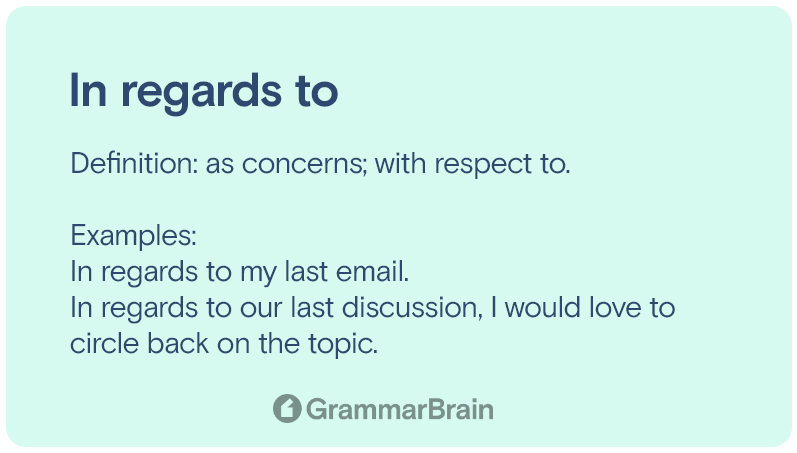The phrase “in regards to” is not easy to understand. And you often use it at the workplace to communicate formally. The word “regard” means “to consider.” When used in a phrase, you can say “in regard to” while rendering the phrase. However, “in regards to” is incorrect.
“Regard” is a singular noun and when used in a phrase or an idiom, highlights something important.
When using the plural noun “regards,” you are sharing your good wishes. When introducing a new topic in the middle of a presentation, you can use the phrase “in regard do” and then present something new.
You can also change the phrasing to “with regard to” and “regarding.” This change will not affect the meaning of the statement made.

“In regards to” or “in regard to” (differences and meaning)
On the other hand, “in regards to” being erroneous is widely used and accepted by some. For example, “As regards the anonymous note found, I will find out who wrote it.”
You cannot use the preposition “in,” which has been replaced with “as,” to make the sentence appropriate. However, the plural version of “in regards to” is better avoided.
Examples of “in regards to”:
- In regards to my last email.
- In regards to our last discussion, I would love to circle back on the topic.
| Word | Definition |
| Regard (verb) | consider or think of (someone or something) in a specified way. |
| In regards to (with regard to) | as concerns; with respect to. |
Simple trick to help remember which is correct
Because “in regards to” has an S, you can associate that S with ‘silly.’ In this manner, we can recognize that it is better to use “in regard to.”
Or, you can opt for similar words like “about,” “regarding,” “following,” etc.
Regards to (meaning)
“Regards” is a third-person singular simple present tense that you use as a formal farewell greeting. This has been around since 1775. Presently, “regards” functions as a goodbye greeting in business emails.
For example:
- Thanking you.
- With best regards.
Names, greetings, salutations
Other variations to this greeting are kind regards, warm regards, and so on.
We can even orally convey our “regards” to someone who is not present to send best wishes and goodwill.
For example: “Give your mother my best regards.”
Other examples:
- “My regards to your sister. I hope she is keeping well.”
- I gave the old lady in my neighborhood a bouquet with a card saying, “With best regards.”
- “Bella will not be coming this weekend, but she sends her best regards to you.”
On the other hand, “regard” can mean admiration.
- “I have always admired your mother and regard her highly.”
- “The janitor has worked in this school for more than 30 years and is regarded as the most honest man ever.”
On the contrary, you can express a profound disregard by saying, “He is a thief and deserves no regard.”
- “The detective had to regard the evidence before dropping the suspect off his list.”
After regarding the letter his grandson sent as an apology, the grandfather changed his will to include him.
In these sentences, regard means “to consider.”
When you want to express care, you can say, “I asked my father to regard his health and stop smoking.”
The mother has more regard for her ailing son’s health than for the health of her other children.
It can also mean to look or to gaze, as explained in these sentences:
- “The mother regarded the mole she found on her neck with trepidation.”
- “The student regarded the bank statement in her hand and decided to save more.”
Conclusion
In conclusion, regards and regard need to be used with care and caution. They need to be thoroughly understood.
FAQs
Is “I am writing in regards to” correct?
Yes, this is a grammatically correct phrase. And is used to describe the meaning of an email or letter.
Is it in regard to or in regards to?
The correct phrase is “in regards to.” The phrase “in regard to” is incorrect in most sentences.
Inside this article
Fact checked:
Content is rigorously reviewed by a team of qualified and experienced fact checkers. Fact checkers review articles for factual accuracy, relevance, and timeliness. Learn more.
Core lessons
Glossary
- Abstract Noun
- Accusative Case
- Anecdote
- Antonym
- Active Sentence
- Adverb
- Adjective
- Allegory
- Alliteration
- Adjective Clause
- Adjective Phrase
- Ampersand
- Anastrophe
- Adverbial Clause
- Appositive Phrase
- Clause
- Compound Adjective
- Complex Sentence
- Compound Words
- Compound Predicate
- Common Noun
- Comparative Adjective
- Comparative and Superlative
- Compound Noun
- Compound Subject
- Compound Sentence
- Copular Verb
- Collective Noun
- Colloquialism
- Conciseness
- Consonance
- Conditional
- Concrete Noun
- Conjunction
- Conjugation
- Conditional Sentence
- Comma Splice
- Correlative Conjunction
- Coordinating Conjunction
- Coordinate Adjective
- Cumulative Adjective
- Dative Case
- Determiner
- Declarative Sentence
- Declarative Statement
- Direct Object Pronoun
- Direct Object
- Diction
- Diphthong
- Dangling Modifier
- Demonstrative Pronoun
- Demonstrative Adjective
- Direct Characterization
- Definite Article
- Doublespeak
- False Dilemma Fallacy
- Future Perfect Progressive
- Future Simple
- Future Perfect Continuous
- Future Perfect
- First Conditional
- Irregular Adjective
- Irregular Verb
- Imperative Sentence
- Indefinite Article
- Intransitive Verb
- Introductory Phrase
- Indefinite Pronoun
- Indirect Characterization
- Interrogative Sentence
- Intensive Pronoun
- Inanimate Object
- Indefinite Tense
- Infinitive Phrase
- Interjection
- Intensifier
- Infinitive
- Indicative Mood
- Participle
- Parallelism
- Prepositional Phrase
- Past Simple Tense
- Past Continuous Tense
- Past Perfect Tense
- Past Progressive Tense
- Present Simple Tense
- Present Perfect Tense
- Personal Pronoun
- Personification
- Persuasive Writing
- Parallel Structure
- Phrasal Verb
- Predicate Adjective
- Predicate Nominative
- Phonetic Language
- Plural Noun
- Punctuation
- Punctuation Marks
- Preposition
- Preposition of Place
- Parts of Speech
- Possessive Adjective
- Possessive Determiner
- Possessive Case
- Possessive Noun
- Proper Adjective
- Proper Noun
- Present Participle
- Prefix
- Predicate



